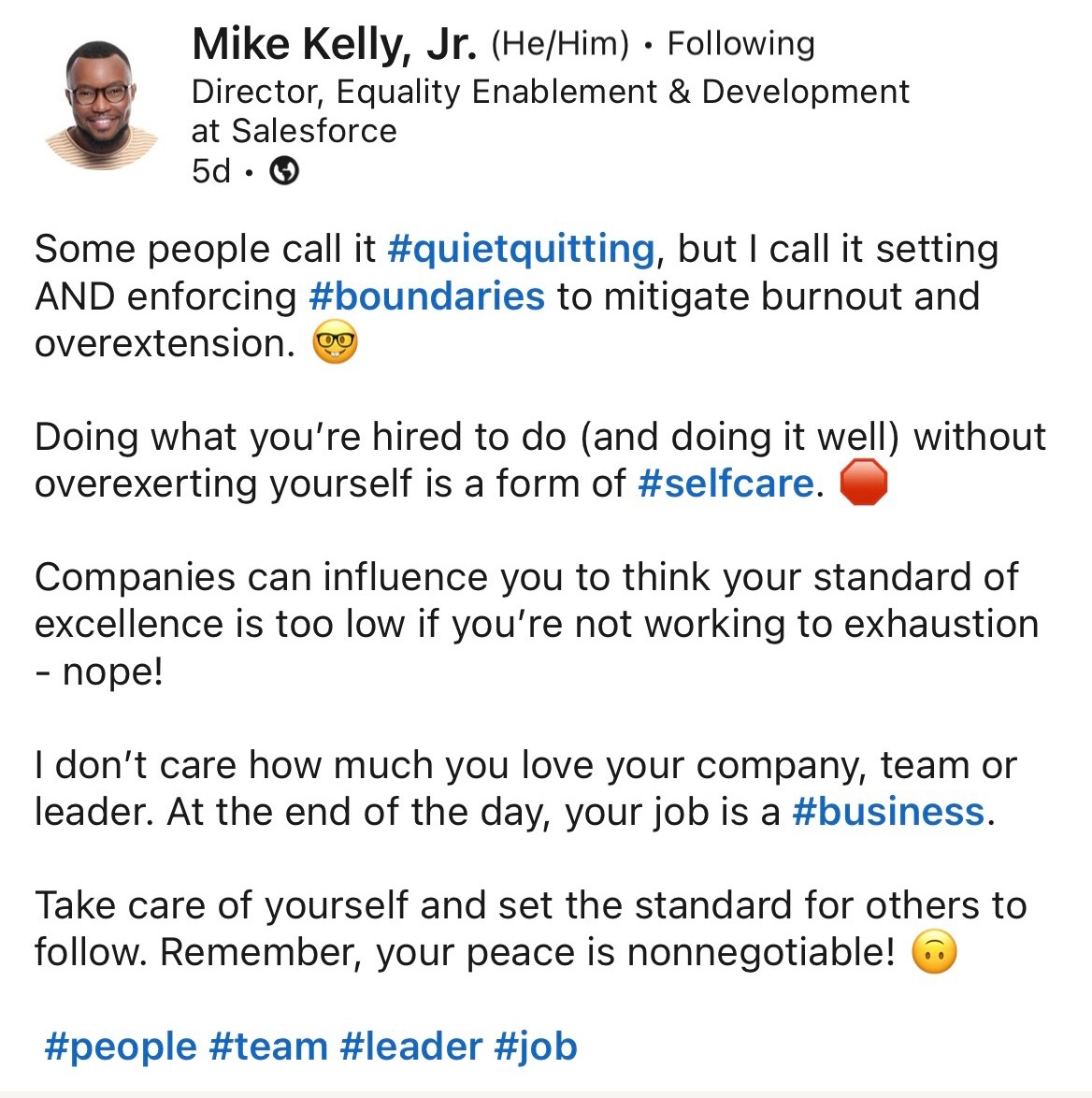A Cup of Ambition is a weekly newsletter filled with thought-provoking essays, interviews, links, and reflections on all things related to working motherhood. If you are here because someone shared this with you, I hope you’ll subscribe by clicking on the button below.
If you even casually scan the headlines, then you’ve surely seen a lot of buzz about “quiet quitting”. It seems like everyone is talking about it—in the past week and a half, I’ve had four separate conversations with friends and colleagues about it. Everyone has heard of it, but most people seem confused by it (likely because it doesn’t actually involve leaving your job).
I was chatting with some fellow parents at a birthday party this weekend when one turned to me and said, “Seriously though, what the f*ck is quiet quitting? Can you please write an article on this?” Ask you and you shall receive…
So, what is it?
The term was coined—where else?—on Tik Tok. Though some have interpreted the phase to mean doing the bare minimum required to avoid getting fired, the original viral post defines it differently:
“You’re not outright quitting your job, but you’re quitting the idea of going above and beyond. You’re still performing your duties, but you’re no longer subscribing to the hustle culture mentality that work has to be your life—the reality is, it’s not. And your worth as a person is not defined by your labor.”
As several people have pointed out, this concept of workers rebelling against dehumanizing workplaces is hardly novel (see: Karl Marx). But this issue of what role work should play in our lives does feel especially acute in this particular sociocultural moment when millions of workers continue to re-evaluate what they want from their careers.
A recent survey found that a staggering 77% of workers reported experiencing burnout in their current job. On top of that, inflation is outpacing wage increases by two-fold, leading to a decline in real wages. And, as companies prepare for a recession, layoffs are becoming increasing common. No wonder so many people are questioning whether the grind is actually worth it.
The debate
Unsurprisingly, this discourse has sparked strong opinions on both sides. In a LinkedIn post, Arianna Huffington wrote, “Quiet quitting isn’t just about quitting on a job, it’s a step toward quitting on life”. Frankly, this rhetoric seems a bit histrionic, but I do get her point. For those of us who have been raised on a steady diet of “work hard and you’ll achieve great things”, we have to wonder: what do we give up when we give up our drive? If we decide to put in less effort at work, will we just be wracked with anxiety and guilt? Is it even possible?
On the other hand, the pandemic has emphasized the urgent necessity of stronger boundaries between work and home. Some people argue that quiet quitting might actually be the cure for burnout, as it allows us to pace ourselves so that work is more sustainable:
What this means for working parents
“Sooo”, one of my friend said, “if quiet quitting means ‘meeting, but not exceeding expectations’, then I’m pretty sure I quietly quit my job five years ago after my second kid was born”. Regardless of what you call it, many working parents have grappled with some version of this debate for years.
I know so many working parents—particularly moms (myself included)—who have asked some version of this question: “Do I take the steady, if underwhelming, job that allows me greater balance but doesn’t challenge me? Or do I pursue my passion/chase the title/maximize my ambition, even if it means more taking more time/mental energy away from my family?”
The answer to this question is incredibly nuanced and individualized (and one that an executive coach can certainly help you tease apart 😉). But it is also time-specific, and I think many people tend to forget this part.
Listen, I don’t know what you’ll want five years from now, but my point is… neither do you. Projection bias is the tendency to falsely project current preferences onto future events. What works for you now may not work for you in the future. Just because you want to take a step back from a demanding career and work part-time while your kids are little, doesn’t mean that you have permanently lost your drive. Similarly, jumping on a lucrative opportunity or doubling-down on your career right now doesn’t mean it will work for you forever.
Yes, we have to plan ahead and be mindful of the long-term impact of our current decisions, but we also have to take into account what works for us now, without making sweeping overgeneralization about what it means about our identity or future selves. So, whether you’re quietly quitting or loudly leaning in, know that this is a season of life. Who knows what the future holds for you?
I want to cover what’s important to YOU. I welcome reader input in deciding what and who to write about. Email me at drjessicawilen [at] gmail [dot] com and put “newsletter idea” in the subject.







Great piece! So much of this sounded like our conversation! Thank you.
This is such good reflection. I don't like the term but I'm here for the concept of setting boundaries and not allowing the job to be our lives anymore. I'm a teacher. This has been a necessary move in education for a LONG time and more teachers are embracing it now.